Wed. 7/21. Kathy and her students visited a “foundation” university. Foundation universities are the privately funded higher education institutions in Turkey. For some reason, “private” has the bad connotation of paying for your grades and degree. So “foundation” is used instead. All higher education institutions in Turkey must be non-profit.
In order to get into a college or university in Turkey, a high school student must take the national entrance exam. A million and a half students sit for this exam — all on the same day! There are actually 10 separate subject exams and you take the ones required for the major or program (called “faculty”) you want to be admitted to. After your exam is scored, the scores are released to the colleges and universities. They can then compete for the very best students by contacting the highest 5,000 scorers.
Meanwhile, after they get their scores the students have three weeks to compile a ranked list of the schools and programs (i.e., faculties) they would most like to enter. Students can list up to 30 “faculties” of particular universities but some students, if they are very confident about their entrance exam score, only list one university and faculty. Each program has a certain number of slots. Everyone knows what scores were required to get into certain programs the previous year, so students have a good idea of how high they can aim.
A computer program, using an algorithm, assigns each student to one or 0 (zero) programs, depending on the individual score, scores of other students, and the number of slots available in the desired program. Only 20% of those who took the test are assigned and enroll into the one program to which they are assigned. If students do not get a program slot, they can take the test again the next year. More commonly, they enroll in a public university in Cyprus, or, as a third choice, a private university in Cyprus. They also may attend other universities in Europe.
Sabancı
Note, there is no “dot” over the “I.” There is a Turkish letter. The “C” sounds as “j”, the “ı” sounds a “U” in cube. Sah ban chew University. I think…
The founders of the University, the Sabancı family, are a prominent family in Turkish business and philanthropy. They wanted to fund a transformative institution of higher education in Turkey. SU is student focused, supports academic freedom, concentrates on a social and natural sciences, and is very selective. 2.5% of the undergraduate students rank in the top 3,000 of the 1.5 million students who take the Turkish University Entrance Examination. They are also the only Turkish higher education institution that has a general education curriculum in the first two years. This works well for Sabancı because, if a student is placed in a program that he or she does not like, there is no option to transfer. At Sabancı, students do not declare a major until their junior year. This is the only university in Turkey where this is possible.
The University opened in 1996 and currently has about 3,500 students, about 80% undergraduates. They maintain a strong emphasis on social and natural sciences. Among other programs in their engineering faculty, they offer mechatronics and they are building a nano technology center. They intentionally built the University outside Istanbul, close to the industries they hope to partner with. Because they built it on the outskirts of the city, they were able to build a beautiful completely contiguous campus complete with gymnasium, amphitheatre, student center, residence halls, and faculty apartments.
One exciting moment in the visit was when we were shown a list of faculty who had won awards. Last year’s winner of the 2009 International Research Award First Prize was Dr. Tambar, assistant professor in the department of religion, University of Vermont!!!
We were hosted by E. Cansu Ciğa and Ekin Burak Arikan. After Ms. Ciğa showed us around the campus Mr. Arikan engaged us with a presentation and discussion. We discussed SU, Turkish higher education in general and the purposes and status of the Bologna Process.
Thank you Sabancı University for your generosity!
- Robotics is part of their mechatronics program
- Math symposium
- Construction of Nanotech center
- Discussing Bolonga
- Manmade pond w/ waterfall
- Gym and fitness center
- Atrium in performing arts center
- Theatre
- Performing arts center
- Library
- Art show poster
- Dining hall
- Tech store in student union
- Campus tour
- SU mission statement
- A welcome
- And then… SU!
- Then we get into industrial parks
- Finally getting somewhat rural
- Then it starts to thin out
- Lots of residential buildings for miles
- Commuters going into the European side
- Looking from Europe to Asia
- Approaching the Bosphorous bridge
- Taking a bus to Sabancı University


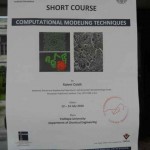

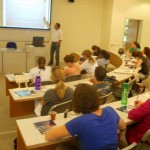

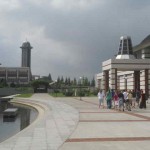




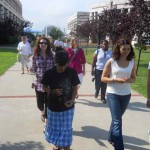









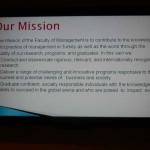
















The process of entering a university in Turkey is a great stress for many families. I pity the younger generation, who are treated as race horses once they start 5th grade, all in the name of getting into a”good school”…
Sabancı is one of the best schools in Turkey. If I were to study all over again, I would’ve loved studying there 🙂
It is very nice to hear about your campus and even envious that it has all the facilities including gym. It will create wonderful atmosphere to develop all skills over and above education.
Home Gym Fitness Equipment
Thanks – interesting blog.
Is UVM thinking of setting up an exchange programme with Sabanci university? Would be cool to go to Europe and Asia at the same time…